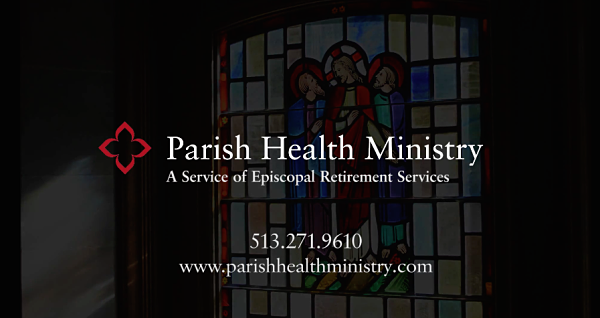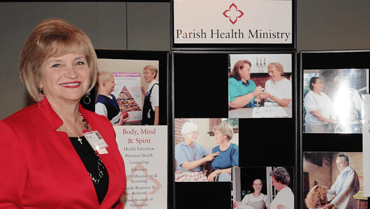
What happens when health care and faith meet? Spiritual needs are the central focus of faith-based organizations with very little time spent addressing physical and mental health needs. And in the scientific, medical community, doctors and nurses focus intently on improving their patients' physical and mental wellbeing but little time addressing the spiritual aspects of healing that are important to adherents of many faiths.
This disconnect leaves a gap in care and support for people of faith. And Episcopal Retirement Services' recognition of that situation led to the development of Parish Health Ministry (PHM).
We encourage churches to renew or deepen their role in health care.
Religion has traditionally played a role in healthcare. Faith and spirituality have traditionally played a role in healing. When people are sick or injured, we pray for them. We ask for health to be granted to us, to our families and friends. We petition for our doctors' hands to be guided as they treat us.
Ministers, priests, rabbis and other clergy members have counseled family members during health crises, have served as patient or family advocates with doctors and hospitals, have prayed with (and over) congregants in the hospital, have administered last rites or emergency baptisms.
One could make the case, then, that faith organizations served as civilization's first, true social safety net. They've long served as social support mechanisms that promote convalescence and minister to the needs of the infirm. But as medical science has demonstrated its prowess in healing physical problems, the role of faith in healing has become somewhat eclipsed in the public eye.
Here in Cincinnati, congregations have over the years provided meals and wellness checkups to seniors aging at home, to new mothers and to grieving families. Some have even built clinics, hospitals and retirement homes.
Parish Health Ministry encourages Cincinnati and Central and Southern Ohio congregations to renew or deepen their traditional role in promoting individuals' wellbeing by promoting health, preventing disease, responding to crisis and emphasizing a holistic approach to wellness and healthcare through the use of nurses, other healthcare professionals and interested lay people who are members of the church. It seeks to give Ohioans belonging to 77 area churches and organizational partners access to providers with a purpose.
What do we mean when we say "providers with a purpose?"
Dr. John Van Kirk and his wife, Rosemary, had long been members of Hyde Park's Church of the Redeemer when she was diagnosed with Alzheimer's disease in 2004. Over the next eight years, they tried to live as normally as they could. Eventually, when Rosemary's care needs became too great for Dr. Van Kirk to handle alone, he contacted his church's Parish Health nurse, Betsy Babb.
As a registered nurse, Babb was able to help the Van Kirks navigate the process of treatment, connect them with community resources and work to address their spiritual needs by encouraging the congregation as they supported them.
"It was truly a family of people keeping us in their prayers, being with us when they could,” Van Kirk said, and "very touching."
What programs and services does Parish Health Ministry provide?

Part of PHM's role is to provide a support structure for people undergoing care. Part of it is to promote wellness and good nutrition. And sometimes, its role is to directly intervene.
In addition to sponsoring fitness efforts like "Walk to Bethlehem" and "Walk 50 Miles in 50 Days," PHM distributes wellness and nutrition information to at-risk parishioners and their caregivers. It recruits and trains volunteers to visit and conduct wellness checks on homebound seniors. And it hosts a networking group for people involved in health ministry to share ideas.
PHM participates in the Yellow Dot program, which provides a means by which incapacitated accident victims can communicate vital medical history to first responders, and Vial of Life, which provides free containers of health forms and alert magnets on which emergency responders can find a person's medical information.
It also conducts health checks, including blood pressure and diabetes screenings. Occasionally, such screenings have detected potentially life-threatening conditions and have enabled individuals to seek prompt treatment. PHM also provides end-of-life support for families through its Journeying Through Grief program.
Through Parish Health Ministry, we are more than a retirement care provider.
Episcopal Retirement Services provides quality retirement communities in Cincinnati. But we're so much more than that — our broad palette of services are the very reason we changed our name.
Through our Parish Health Ministry and other outreach services, we have become a more comprehensive, accessible provider for Cincinnati seniors' wellness needs. Our purpose is to provide care wherever we find it is needed.












